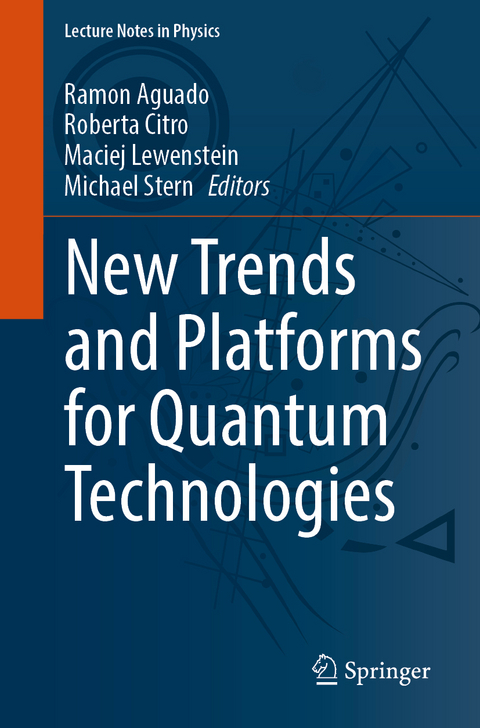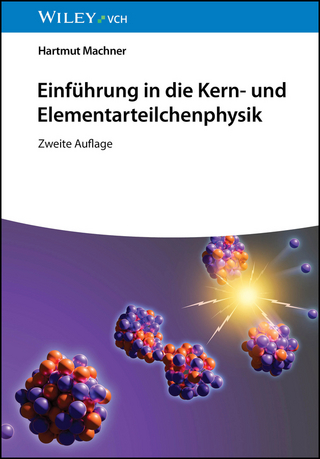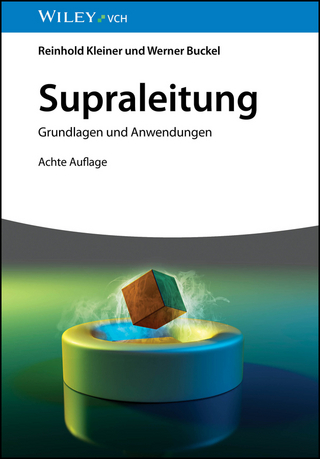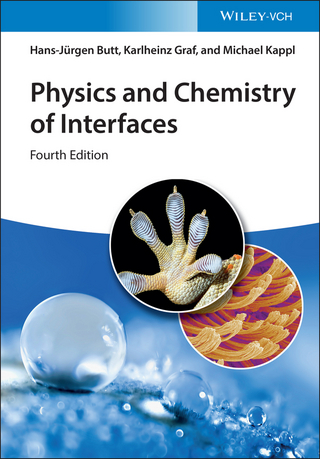
New Trends and Platforms for Quantum Technologies
Springer International Publishing (Verlag)
978-3-031-55656-2 (ISBN)
This book serves as a comprehensive introduction to quantum computing platforms, inspired by recent advancements in quantum technologies aimed at detecting and manipulating single quantum objects. Encompassing solid-state, atomic, and optical platforms, it delves into various aspects of quantum computing, including topological quantum computing. The content covers the fabrication, modeling, and numerical implementation of quantum circuits, such as Josephson junctions and qubits, along with hybrid nanostructures. Additionally, the book introduces quantum entanglement, a crucial concept for quantum communication and information processes. The well-compiled topics and concise presentation position the book as a primer for courses on quantum technologies.
Ramon Aguado is a Senior Scientist at the Spanish Research Council (CSIC) with more of 20 years of experience on many aspects of condensed matter theory. His research deals with quantum materials and applications in quantum technologies. During the last years, he worked on topological materials and, in particular, on various aspects of hybrid superconductor-semiconductor nanostructures, which behave as topological superconductors with Majorana quasiparticles. In this field, his group has become an international reference with many impactful theory works and active collaborations with top-leading experimental groups worldwide. Other recent activities include superconducting qubits based on subgap states, the theory of hybrid materials combinations and novel qubit platforms based on them.
Overall, he has published more than 100 research articles with several publications in high impact journals. He appears in various international rankings as a top scientist.
Prof. Aguado is an active member of the scientific community and has participated in many evaluation panels, outreach activities, etc. In 2016, he became an Outstanding Referee of the American Physical Society. He coordinates the Quantum Materials and Quantum Technologies research line at Materials Science Institute Madrid (ICMM) and, since 2020, he serves as Vice-president of the Condensed Matter Physics Division of the Royal Spanish Physical Society.
Roberta Citro is Full Professor of Theoretical Matter Physics at the Department of Physics of the University of Salerno (Italy). In recent years, she has matured professional experience in many-body techniques of low-dimensional systems and in quantum transport in nanostructures. She completed her PhD in Physics at the University of Salerno (Italy) in 1998 defending a thesis on high-temperature superconductors. After her graduation, she was, first, a Post Doc Fulbright fellow at the Physics Department of Rutgers University (New Jersey, USA) where she collaborated with the Condensed Matter theory group. In 2007 she was a Marie Curie fellow under the EU's Sixth Framework Programme-Mobility Action at the Lab LPMMC in Grenoble (France) where she developed studies on mesoscopic physics in quantum gases. In 2013 she has been a visiting scientist at Harvard University.
Recently, she has established in Salerno a team working on topological superconductivity and quantum metamaterials. Overall, she has published more than 200 research articles with various publications in high impact journals. Prof. Citro has an active synergetic activity in the scientific community and has been member of various organizing committees. She is coordinator of the Doctorate in Physics and Innovation Technology at the University of Salerno, serves as referee of the APS, IOP and Nature Group journals, and is PI of national/EU research projects.
Maciej Lewenstein is ICREA Research Professor and leads the quantum optics theory group at ICFO (the Institute of Photonic Sciences) in Castelldefels - Barcelona, Catalonia. He graduated at Warsaw University in 1978 and joined the Centre for Theoretical Physics of the Polish Academy of Sciences in Warsaw, where he remained for 15 years, becoming a professor in 1993. He finished his PhD in Essen in 1983 and habilitated in 1986 in Warsaw. He has spent several long term visits at the University of Essen in Germany, at Harvard University with Roy J. Glauber (Nobel 2005), at the Saclay Nuclear Research Centre (CEA) near Paris with Anne L'Huillier (Nobel 2023), and at the Joint Institute for Laboratory Astrophysics in Boulder, Colorado. He was on faculty of Centre CEA in Saclay during the period 1995-1998, and of Leibniz University in Hannover over the period 1998-2005. In 2005 he moved to Catalonia. His research interests include quantum optics, quantum physics, quantum informatio
Introduction to Quantum Circuits.- From Majorana to Andreev Qubits and Back.- Superconducting Quantum Bits.- Introduction to Entanglement and Non-Locality Theory in Many-Body Systems.
| Erscheinungsdatum | 03.10.2024 |
|---|---|
| Reihe/Serie | Lecture Notes in Physics |
| Zusatzinfo | XI, 285 p. 77 illus., 64 illus. in color. |
| Verlagsort | Cham |
| Sprache | englisch |
| Maße | 155 x 235 mm |
| Themenwelt | Naturwissenschaften ► Physik / Astronomie ► Atom- / Kern- / Molekularphysik |
| Naturwissenschaften ► Physik / Astronomie ► Festkörperphysik | |
| Schlagworte | entanglement and non-locality theory • Majorana particles for quantum computing • quantum circuits • quantum communication processes • superconducting qubits |
| ISBN-10 | 3-031-55656-9 / 3031556569 |
| ISBN-13 | 978-3-031-55656-2 / 9783031556562 |
| Zustand | Neuware |
| Haben Sie eine Frage zum Produkt? |
aus dem Bereich


